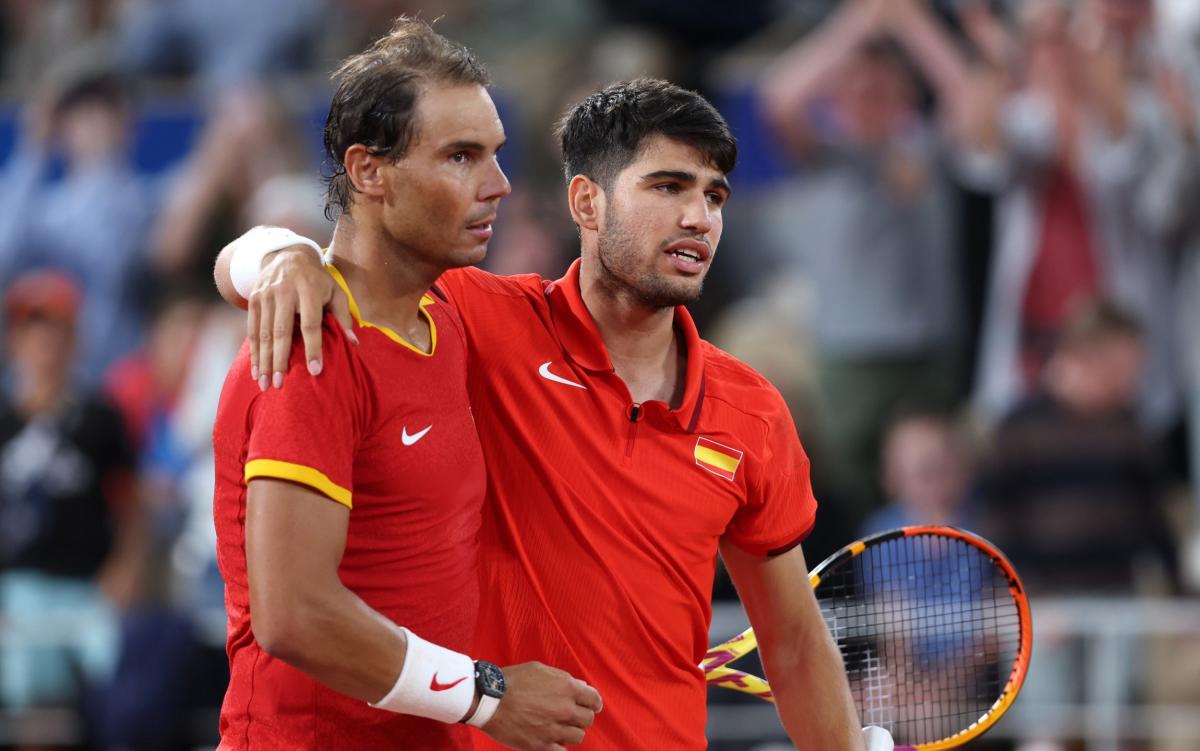Sports
Rafael Nadal outperforms partner Carlos Alcaraz as Spanish pair wins Olympics opener



On Friday night, Rafael Nadal had drawn one of the biggest gasps of the opening ceremony when he popped up unexpectedly to receive the Olympic torch from Zinedine Zidane.
On Saturday, though, Nadal was upstaged by a man who wasn’t even present. The biggest cheer of the day at Roland Garros erupted spontaneously when fans got wind Antoine Dupont’s three extraordinary tries, and France’s first gold medal of these Games.
Never mind. Nadal still enjoyed a standing ovation simply for walking out, and his tennis – in a 7-6, 6-4 victory over Argentinian pair Andres Molteni and Maximo Gonzalez – was exemplary. Despite the concerns over his right thigh, which he had swaddled in strapping after a recent twinge, he moved freely and was comfortably the strongest player on the court.
Roland Garros looked different on Saturday in its blue-and-pink Olympic branding, and so too did Nadal’s partner: world No.3 Carlos Alcaraz. He had played only six previous doubles matches at tour level, and it showed.
In the pairs format, you always look to hit to the weaker player. The irony here is that the weaker player has just won Wimbledon and the French Open back to back. But that was a solo competition, where the sightlines and the tactics are very different. At least Alcaraz improved towards the end of these 105 minutes, so reminding everyone what a ferociously quick learner he is.
On a rain-affected opening day of Olympic tennis, this was one of only two doubles matches to be played, and the Spaniards will have to wait to see whether they face the Dutch pair or the Hungarian one in the next round.


Meanwhile, Nadal remains on the singles schedule for Sunday, with Hungary’s Marton Fucsovics in his sights. That will give us a better idea of his physical condition, though it must be said that his doubles form felt highly encouraging.
Earlier, top singles seed Novak Djokovic had cruised through his first-round match in just 53 minutes, dropping only one game along the way.
Yet the Serbian was not entirely happy. After the match, he queried why he had found himself up against Australia’s Matthew Ebden – a doubles specialist who last played a tour-level singles match more than two years ago.
“Look, I really don’t understand the rules they’re a bit, really not logical for me,” said Djokovic after his 6-0, 6-1 victory. “If somebody withdraws or cancels before or when the draw is made then you call doubles players to play singles.
“I don’t think it’s a good image for the sport, to be honest. There were a lot of singles players that had plenty of time, that were alternates, that could’ve been called to come.”
In response, organisers pointed out the complexities that exist around this event. “Tennis is one of 32 sports at the Olympic Games,” said a spokesperson for the International Tennis Federation. “With 10,500 athletes and 206 National Olympic Committees, it’s logistically extremely difficult, and there has to be a cut-off point for off-site replacements. We have worked hard with the IOC to push the deadline as late as possible given the tennis calendar.”
The last day on which it would have been possible to bring in new singles players was July 19. Since that moment, four men – Andy Murray, Jannik Sinner, Holger Rune and Herbert Hurkacz – have all pulled out, leaving the event with some unexpected faces in the draw.
In an Instagram post, Ebden said “I was lucky in my singles career [that] I played against Federer, Nadal, Murray and played in all the big centre courts around the world but I never played [Court Philippe] Chatrier and I never played Novak so some miracle happened … [It was a] perfect way to retire my singles career.”


